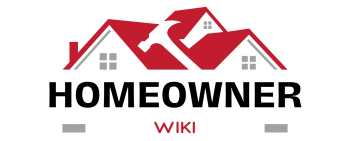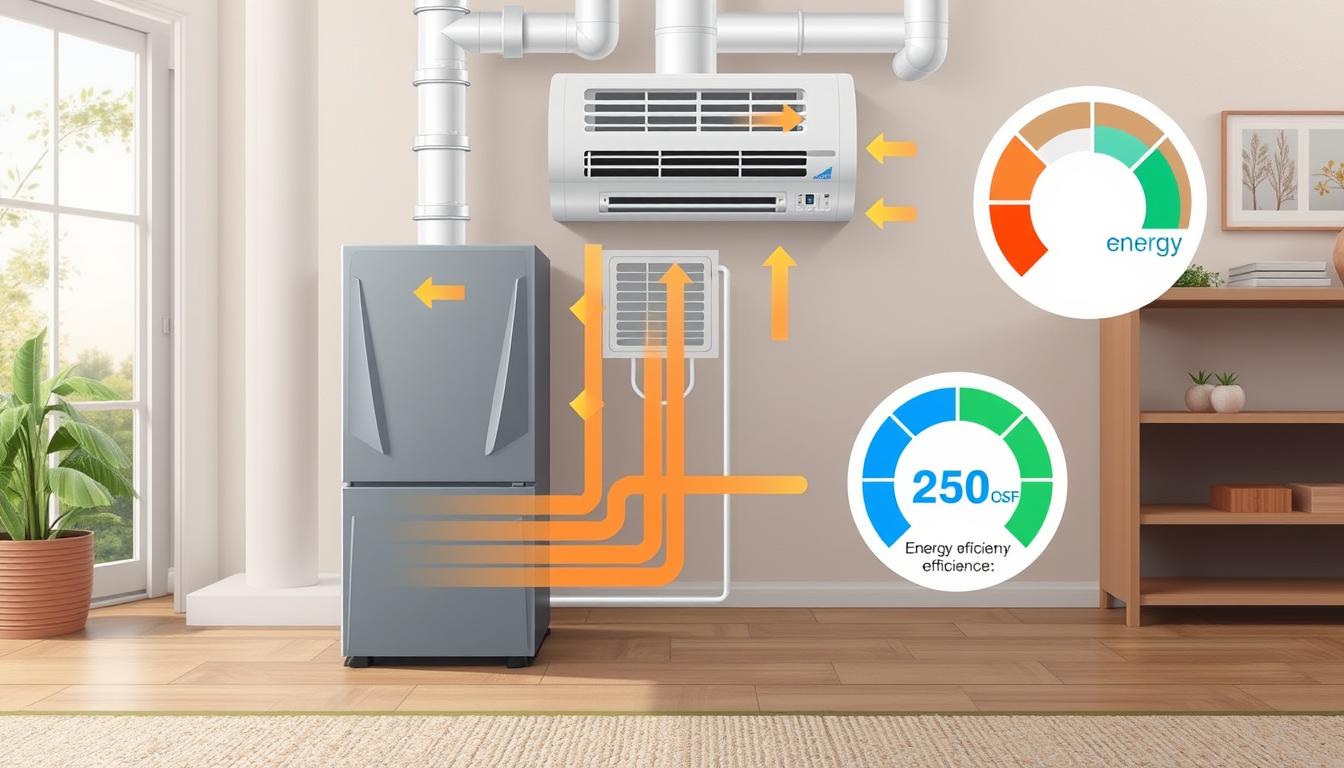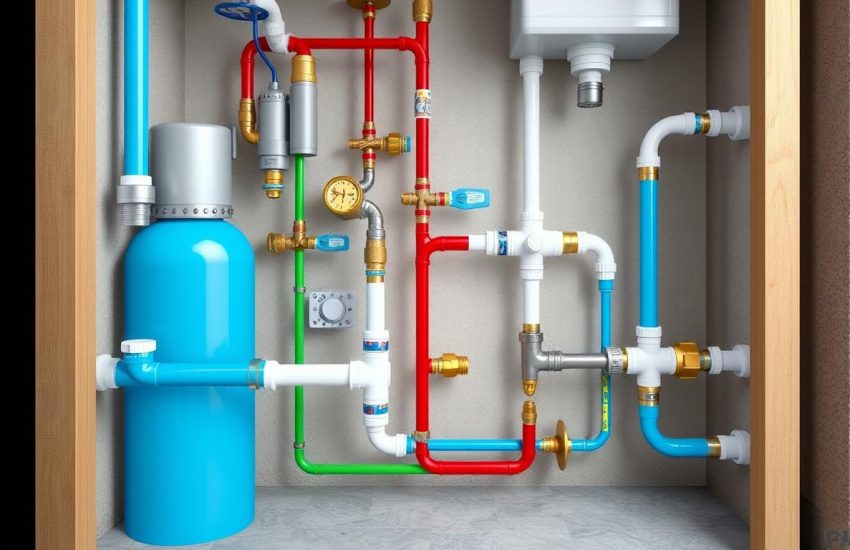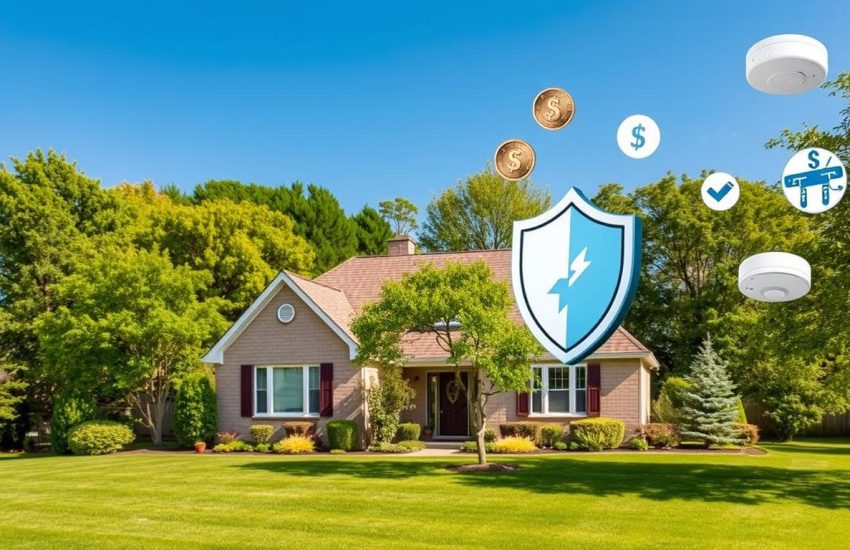Hvac System Savings: A Complete Guide for Homeowners
Have you thought about how your cozy home might be pricier than needed? Imagine cutting down your energy bills and still enjoy better home comfort, indoor air quality, and energy efficiency. We’ll share the secrets to HVAC system savings to help homeowners like you save money. Learn from experts like those at CoolPro Heating & Cooling in Atlanta. They offer great tips on keeping and improving your system for the best results.
Key Takeaways
- Adjusting your thermostat settings can lead to significant annual savings on heating and cooling costs.
- Addressing leaky ducts can prevent up to a 20% reduction in HVAC system efficiency.
- Installing ENERGY STAR-rated windows can average a 12% reduction in energy bills across the nation.
- Strategically planting trees for shade can lead to a 25% decrease in summer cooling costs.
- LED bulbs are not only cost-effective in the long run due to less energy usage and longer lifespan but also enhance energy efficiency.
- Understanding and selecting HVAC systems with the right SEER, HSPF, and AFUE ratings are crucial for long-term savings.
- Regular HVAC system analysis and air filter replacements are essential practices for maintaining system efficiency and lifespan.
Why Focus on HVAC System Savings?
Putting money into HVAC system savings is key for home improvement. It cuts energy bills and boosts optimal indoor comfort. Homeowners often ignore their HVAC systems until big problems show up. Problems like weird temperatures, loud noises, or high bills. By focusing on your HVAC, you save money and help the planet.
HVAC units use a lot of energy in homes. So, there’s a big chance to save money. By choosing better systems, homeowners save about 30% on energy bills. The new rules say systems must be 14 SEER in the north and 15 SEER in the south by 2023.
Upgrading is not just about following rules. It’s also about saving money through tax credits and more. Smart thermostats and zoning systems help save more energy. They heat or cool the house as needed, without wasting energy.
Regular maintenance is very important. It keeps the system working well and avoids big repair costs. Talking to experts helps homeowners pick the best system. This reduces energy bills and keeps homes comfy.
Focusing on HVAC system savings does more than just lower bills. It’s a big step in home improvement that brings comfort and financial savings. A smart HVAC upgrade meets new energy standards. It also makes your home more livable and valuable.
DIY vs Professional Help
When it’s time for HVAC system upkeep, homeowners often wonder. Should they go for DIY HVAC system savings or choose professional HVAC maintenance? This decision can really change how well your system works and how much you spend.
Initial Costs and Long-term Savings: DIY might look cheaper at first but might cost more later because of mistakes. Choosing professional help costs more at first but saves more money over time. This is because it makes your system work better and need fewer fixes.
| Aspect | DIY Installation | Professional Installation |
|---|---|---|
| Initial Cost | Lower | Higher |
| Long-term Costs | Potentially Higher | Lower |
| Safety Factors | Higher Risk | Enhanced Safety |
| Quality of Workmanship | Variable | High Standard |
Going with professional HVAC maintenance means you get experts. They know what they’re doing, follow the law, and use the best methods. This makes sure your system runs smoothly and lasts longer.
Affordability and Efficiency: You can handle simple things like filter changes and cleaning. But for the hard stuff, you need pros. Knowing when to DIY and when to call in experts is key. Regular pro checks can stop small problems from getting big and pricey, helping you save cash down the line.
- Lifespan of HVAC units can be extended by regular professional check-ups: Central air conditioners (15-20 years), gas furnaces (15-30 years), air-source heat pumps (15-20 years), ground-source heat pumps (20-25 years).
- Professional maintenance shows a marked improvement on system’s efficiency, reliability, and longevity.
- Ensuring that the technician team from reputable service providers like Lightfoot Plumbing, Heating, Air & Electrical is skilled enhances system reliability.
In conclusion, while DIY HVAC system savings are tempting for those who like fixing things themselves and want to spend less at first, the benefits of professional HVAC maintenance can’t be ignored. They make sure your system works well and safely, leading to more affordable HVAC system savings as time goes on.
How to Save Money
Making your home’s HVAC system efficient is key to saving money. Opting for energy-smart equipment doesn’t just mean new upgrades. It’s about choosing wisely for big cuts in your utility bills.
Choosing high-efficiency HVAC systems is wise. They don’t just cut down on energy bills over time. They also make repairs less frequent and cheaper. Look for ENERGY STAR certified products. They meet strict energy-efficient guidelines from the US Environmental Protection Agency and the Department of Energy.
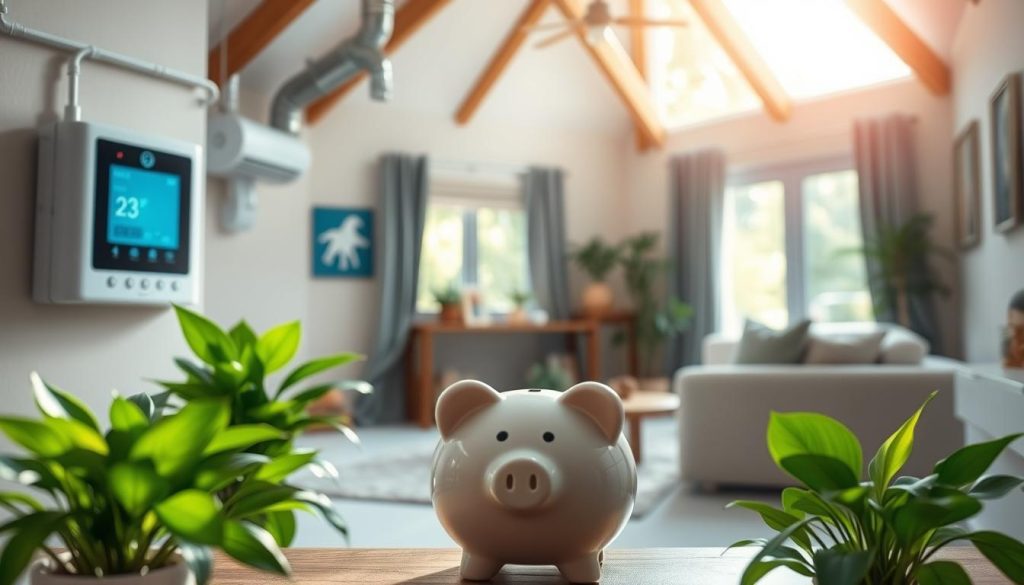
Another way to save is by installing smart thermostats. These cool gadgets adjust your temp automatically. They can cut your utility bills by up to 23%.
| Initiative | Potential Savings | Long-term Benefits |
|---|---|---|
| Smart Thermostat Installation | Up to 23% on utility bills | Enhanced automatic temperature control, personalized settings |
| Sealing Air Leaks | Reduce wasted energy | Improved overall home energy efficiency |
| Energystar Certified Equipment | Varies based on system | Compliance with EPA and DOE energy efficiency guidelines |
| Professional Energy Assessment | Cost upfront but saves long term | Detailed insights into energy usage and waste |
Thinking about upgrades? Check out special deals like tax credits or cash rebates. Low-interest loans for energy-efficient upgrades are also an option. Homeowners might get up to $3,200 a year in tax credits until 2032 for certain updates. Now’s a great time to boost your home’s heating and cooling efficiency.
When getting new systems, always choose professional installation. The right install means your gear will work at top efficiency. This is essential for a cost-effective, energy-efficient home.
For more info, check out energy.gov/energysaver and energystar.gov. They have lots of details on saving energy for different needs and tastes.
Step-by-Step Upgrades
Improving your HVAC system makes your home more comfortable and saves energy. This guide will help make your heating and cooling better and eco-friendly.
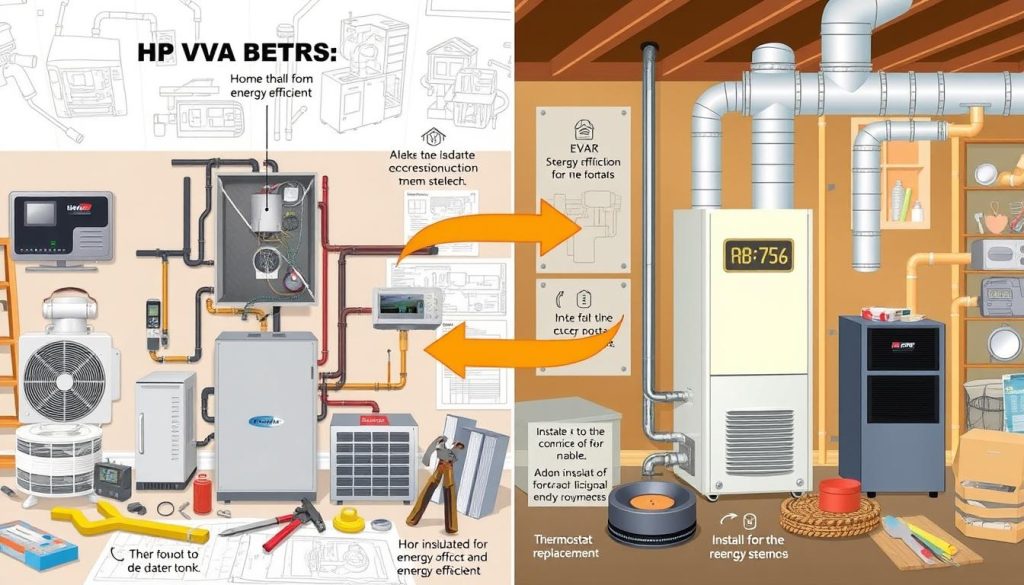
Start with your ductwork, it’s very important. Sealing and insulating ducts can make your system up to 20% more efficient. It’s a great first step towards saving energy.
- Install Smart Technology: Use ENERGY STAR smart thermostats to save about $100 a year. They adjust your home’s temperature automatically to use less energy.
- Upgrade to ENERGY STAR Equipment: Replace old units with ENERGY STAR ones to save up to 20% on heating and cooling. It also improves your HVAC’s performance.
- Opt for High-Efficiency Filters and Blowers: Use HEPA filters for cleaner air. Variable speed blowers also use less energy.
Don’t forget regular maintenance. Checking and fixing your HVAC system keeps it running well. It avoids breakdowns that can be expensive and a hassle.
| Upgrade | Expected Efficiency Increase | Annual Savings Estimation |
|---|---|---|
| Smart Thermostat (ENERGY STAR Certified) | N/A | $100 |
| Sealing & Insulating Ducts | Up to 20% | Variable |
| HEPA Filters | Air Quality Improvement | Health Benefits |
These upgrades make your home greener and save you money on bills. Adding new ENERGY STAR equipment or making your current system better helps a lot. It makes your heating and cooling sustainable and efficient.
Final Tips for Success
As a homeowner, saving on your HVAC system can cut down your energy bills. In summer, make your ceiling fan go counter-clockwise. This lets you up the thermostat but still feel cool. According to the U.S. Department of Energy, this trick means you can set your thermostat 4 degrees higher without losing comfort. Also, getting your HVAC checked in fall or spring helps avoid surprises and keeps it running long. Booking a pro inspection is smart.
To use less energy, just raise the thermostat when you’re out. Also, use the fan mode when it’s cool outside. These steps can save you up to 10% on energy. Cleaning filters isn’t only about saving money. It also makes the air cleaner and the system work better. According to the Energy Department, a new filter every 1-3 months cuts energy use by 5 to 15%. The Consortium for Energy Efficiency helps you pick efficient equipment. This can lower your bills even more.
Setting money aside for HVAC emergencies is key. Also, look for rebates and special deals. Rebates help with the upfront costs. Smart thermostats and ENERGY STAR products save you money over time. Remember, this isn’t just about money. It’s also for your family’s comfort and health. Better air and a steady home temperature are important. These smart choices help both your wallet and your living space.
